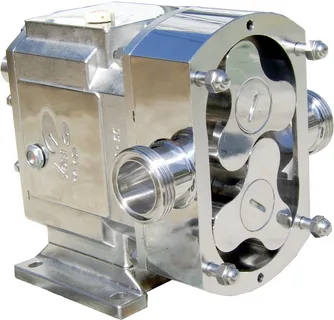In the cosmetics industry, precision and care are paramount. The delicate nature of cosmetic products demands equipment that ensures both efficiency and the preservation of product integrity. Among the key technologies utilized in this sector are lobe pumps. Known for their gentle handling and reliable performance, lobe pumps play a critical role in cosmetics manufacturing processes. This article explores their benefits, applications, and features, highlighting why they are an indispensable tool for the industry.
The Role of Lobe Pumps in Cosmetics Manufacturing
Lobe pumps are renowned for their ability to handle sensitive and viscous materials with exceptional care. In cosmetics manufacturing, products such as creams, lotions, gels, and shampoos require gentle treatment to maintain their texture and quality. The design of lobe pumps ensures minimal shear, making them ideal for these applications. Their ability to pump viscous and fragile materials without compromising their properties is a significant advantage.
Moreover, lobe pumps are versatile and can handle a wide range of viscosities and particle sizes. This adaptability is crucial in the cosmetics industry, where formulations vary significantly. By maintaining consistency and quality across different product lines, lobe pumps ensure that manufacturers meet stringent quality standards while optimizing production efficiency.
Advantages of Lobe Pumps in Maintaining Product Integrity
One of the standout features of lobe pumps is their gentle pumping action. This feature is particularly important in cosmetics manufacturing, where the structural integrity of ingredients must be preserved. For instance, emulsions, which are common in cosmetics, can easily break down under excessive shear. Lobe pumps mitigate this risk with their non-invasive operation, preserving the desired consistency and functionality of the product.
Additionally, lobe pumps are designed for hygienic applications, making them a perfect fit for the cosmetics industry. Their smooth internal surfaces and ease of cleaning minimize contamination risks. Many lobe pumps comply with strict hygiene standards, such as those set by the FDA, ensuring that cosmetic products remain safe for consumers.
Applications of Lobe Pumps in Cosmetics Manufacturing
Lobe pumps are employed in various stages of cosmetics production. One common application is in the transfer of raw materials, such as oils, waxes, and active ingredients, to mixing and blending tanks. Their ability to handle diverse viscosities ensures that these materials are transferred efficiently without degradation.
Another critical application is the filling and packaging process. Lobe pumps deliver precise and consistent volumes, which is essential for maintaining product uniformity. Whether it’s filling tubes of hand cream or jars of facial masks, the precision of lobe pumps enhances productivity and reduces waste, contributing to cost-effective manufacturing.
Features That Make Lobe Pumps Ideal for the Cosmetics Industry
Several features make lobe pumps particularly suited for cosmetics manufacturing. Firstly, their low shear pumping mechanism protects delicate formulations. This feature ensures that products maintain their desired texture, viscosity, and effectiveness. Additionally, lobe pumps are self-priming and capable of handling solids, making them versatile for a range of cosmetic products.
Another notable feature is their durability and reliability. Lobe pumps are constructed from robust materials that can withstand the demands of continuous operation. Their ability to perform efficiently under high-pressure conditions makes them a dependable choice for large-scale production facilities. Furthermore, the modular design of lobe pumps allows for easy maintenance and customization to suit specific manufacturing needs.
The Future of Lobe Pumps in Cosmetics Manufacturing
As the cosmetics industry continues to grow, the demand for efficient and reliable pumping solutions will also rise. Lobe pumps are well-positioned to meet these evolving needs. Innovations in pump design, such as enhanced energy efficiency and smart monitoring systems, are likely to make lobe pumps even more attractive for manufacturers.
Sustainability is another area where lobe pumps can contribute significantly. Their efficient operation reduces energy consumption and minimizes waste, aligning with the industry’s shift towards eco-friendly practices. By investing in advanced lobe pump technology, cosmetics manufacturers can improve their processes while supporting sustainability goals.
In conclusion, lobe pumps are a vital component of cosmetics manufacturing, offering a unique combination of gentleness and efficiency. Their ability to handle delicate formulations, maintain hygiene standards, and enhance productivity underscores their importance in the industry. As technology advances, lobe pumps will continue to play a pivotal role in shaping the future of cosmetics production.
